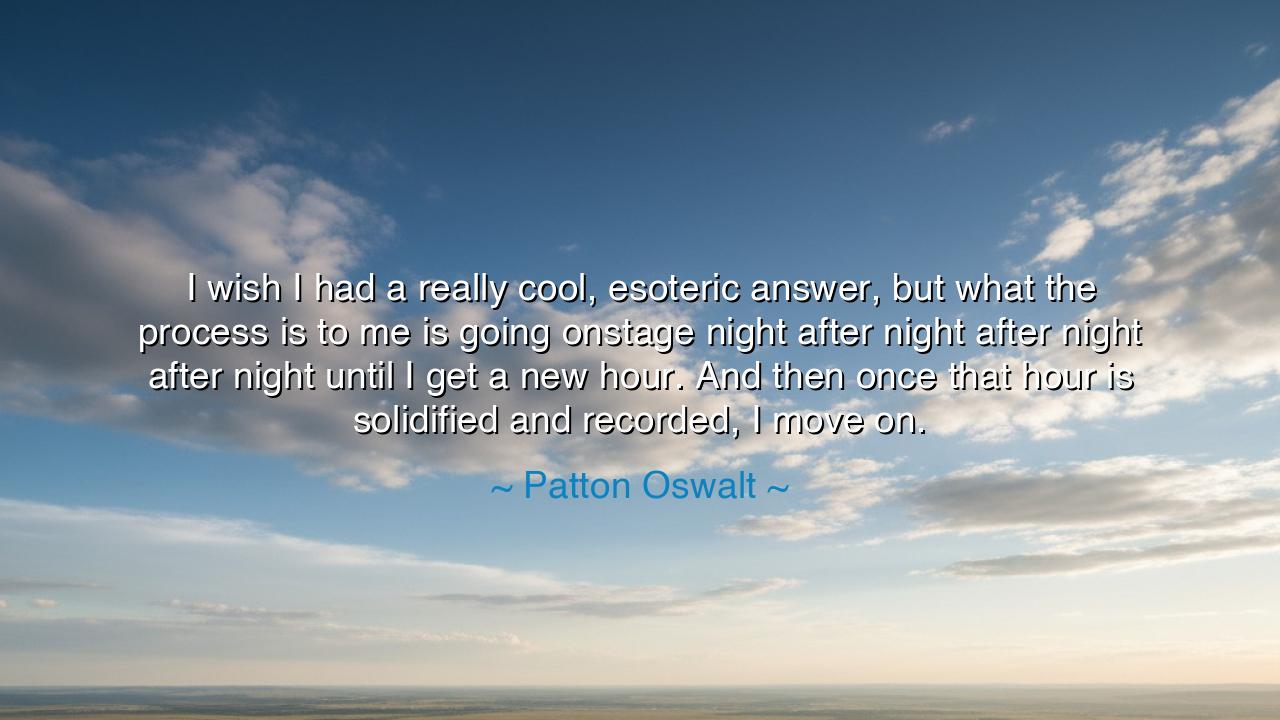
I wish I had a really cool, esoteric answer, but what the process
I wish I had a really cool, esoteric answer, but what the process is to me is going onstage night after night after night after night until I get a new hour. And then once that hour is solidified and recorded, I move on.






“I wish I had a really cool, esoteric answer, but what the process is to me is going onstage night after night after night after night until I get a new hour. And then once that hour is solidified and recorded, I move on.” Thus spoke Patton Oswalt, the comedian-philosopher of persistence, whose humor is laced with honesty and whose craft reveals the sacred power of repetition. In his words lies no glamour, no mysticism—only the quiet, enduring strength of discipline. For he tells us that creation is not born of mystery, but of devotion; not from flashes of brilliance, but from steady, humble labor.
The origin of this quote arises from Oswalt’s own life as a stand-up comedian—a life of endless nights before restless crowds, of failure and triumph, of laughter both given and withheld. Many look to artists and ask for secrets: “What is your inspiration? What mystical spark fuels your genius?” But Oswalt answers with the truth of the craftsman: there is no secret. There is only the process—the showing up, the enduring, the refinement that comes through repetition. He demystifies creation, reminding us that greatness is not a miracle but a practice.
In his words, “night after night after night,” we hear the rhythm of ritual. It is the heartbeat of every master across history. The sculptor who carves the same curve until it breathes; the musician who rehearses a single passage until the fingers become memory; the monk who chants each morning to awaken the soul—these, too, live Oswalt’s wisdom. To create is to endure monotony until it transforms into mastery. The divine is found not in the extraordinary, but in the repetition of the ordinary done with purpose.
Consider the story of Michelangelo, who spent four years painting the ceiling of the Sistine Chapel. Day after day, he climbed the same scaffolding, his body aching, his eyes strained, his hands stained with pigment. There was no glamour in his toil—only sweat, solitude, and perseverance. Yet from that repetition emerged eternity. He, like Oswalt, did not rely on sudden inspiration; he relied on routine, on the sacred rhythm of work that turns persistence into beauty. The brush and the microphone are different tools, but they speak the same truth: art is labor sanctified by patience.
Oswalt’s practice—refining an hour of comedy, night after night—teaches that perfection is not a goal but a process. Each performance becomes a test of truth. Some jokes die in silence, others blossom into laughter, and through that cycle of failure and success, the artist discovers what endures. He “solidifies and records” his hour, not as an ending, but as a passage. Once the work is done, he moves on—not clinging to past triumphs, but ever-seeking the next challenge. This is the way of growth: to complete, release, and begin anew.
His words stand as a rebuke to a world that worships instant success. We live in an age that prizes the result, not the effort, and forgets that mastery is born from repetition. But Oswalt reminds us that consistency is the truest form of genius. To rise each day and face one’s craft without glory, to work when no one applauds, to build something meaningful through countless small acts—that is the mark of the devoted. Just as the farmer must till the soil each season to yield his harvest, the artist must perform, fail, and refine to harvest truth.
Therefore, dear listener, take this lesson from Patton Oswalt: do not chase the esoteric, the mysterious, or the dramatic in your pursuit of greatness. Chase the daily practice. Show up, even when it is dull. Work, even when it feels futile. The path to mastery is not a blaze of inspiration, but a long pilgrimage of persistence. And when your hour—whatever form it takes—is finally solidified, record it in your heart, then let it go, and move forward once more.
For life itself is the stage, and every day a performance. To live well, you must do as Oswalt does: step into the light again and again, armed not with the need for applause, but with the quiet faith that through repetition, through effort, through devotion, you draw nearer to the truth of your art—and the truth of yourself.






AAdministratorAdministrator
Welcome, honored guests. Please leave a comment, we will respond soon